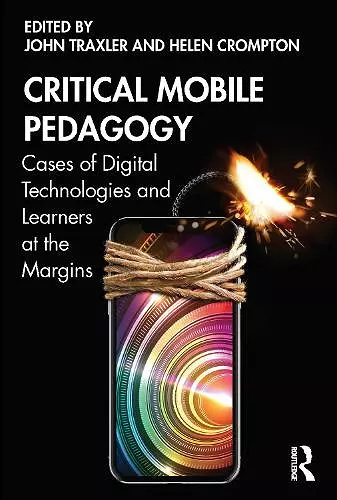Critical Mobile Pedagogy
Cases of Digital Technologies and Learners at the Margins
John Traxler editor Helen Crompton editor
Format:Paperback
Publisher:Taylor & Francis Ltd
Published:27th Nov '20
Currently unavailable, and unfortunately no date known when it will be back
This paperback is available in another edition too:
- Hardback£145.00(9780367204556)

Critical Mobile Pedagogy is an exploration of mobile technologies for designing and delivering equitable and empowering education around the globe. Synthesizing a diverse range of projects and conceptual frameworks, this case-based collection addresses the ambitions, assumptions, and impacts of interventions in under-researched, often disadvantaged communities.
The editors and authors provide a nuanced and culturally responsive approach to showcasing:
- indigenous, nomadic, refugee, rural, and other marginalized communities
- emerging pedagogies such as curation, open resources, massive open online courses (MOOCs), and self-directed learning
- contextual factors, including pedagogy, ethics, scaling, research methodology and culture, and consequences of innocuous or harmful implementation and deployment
- the nature of participation by global capital, multinationals, education systems, international agencies, national governments, and telecoms companies.
Scholars, academics, policymakers, and program managers are increasingly using mobile technologies to support disadvantaged or disempowered communities in learning more effectively and appropriately. This book’s diverse research precedents will help these and other stakeholders meet the challenges and opportunities of our complex, increasingly connected world and work with greater cultural and ethical sensitivity at the intersection of education, research, and technology.
"In a world where ‘distributed’ is the new watchword, this book fits the bill. It examines mobile-based distributed education in a wide variety of settings, ranging from the polar, temporal, and tropical regions as well as among people who are itinerant or homeless. Further, there is the analysis of the spectrum of learning situations, including disadvantaged learners, learners in traditional cultures, and adult learners. We owe the authors a debt of gratitude for this broad and comprehensive canvas."
—Rich Ling, Shaw Foundation Professor of Media Technology in the Wee Kim Wee School of Communication and Information at Nanyang Technological University, Singapore
"Helen Crompton and John Traxler are to be congratulated for bringing together such an unusual and interesting collection of essays around the use of mobile digital technologies for learning in some of the world’s most marginalised and fragile contexts. This is not the normal eulogistic account of ‘mobile learning,’ but rather a volume of thoughtful contributions from diverse parts of the world that seek to challenge and fragment existing understandings. Their conclusions outline an agenda for the future use of mobile technologies in learning that is more nuanced and problematised, intent on empowering some of the world’s most marginalised people and communities."
—Tim Unwin, UNESCO Chair in ICT4D and Emeritus Professor of Geography at Royal Holloway, University of London, UK
"This is a powerful, impressive, and challenging book. Whilst most discussion of digital, and particularly mobile, technology starts from either an exploration of the possibilities and challenges raised by the technology or by thinking about the educator’s task in designing learning programmes using digital tools, the huge strength of these essays is that they start with learners’ cultures, needs, and experiences. As a result, the examples offered of work with Indigenous people in Alaska, Wolof women in Senegal, refugees arriving in England, and people both materially and digitally marginalised in the Global North offer fresh insights and critical challenges to educators.
"How can media which are overwhelmingly dominated by English and the languages of the Global North be adapted effectively so that speakers of languages marginal in their own countries can use them successfully? How effectively can material and learning programmes be co-created with people using mobile technology when access to wi-fi infrastructure is so uneven? How far can education strategies for critical engagement with on-line information and disinformation be adapted for very different cultural circumstances? What works in one context may not transfer to another – but the role of listening as a springboard to dialogue is common to the different experiences captured.
"This collection will stimulate readers to think hard about how to most effectively use technology with and on behalf of disadvantaged and marginalised communities to enable them to engage on their own terms and for their own purposes."
—Sir Alan Tuckett, OBE is Professor of Education at the University of Wolverhampton, UK
ISBN: 9780367204570
Dimensions: unknown
Weight: 453g
236 pages